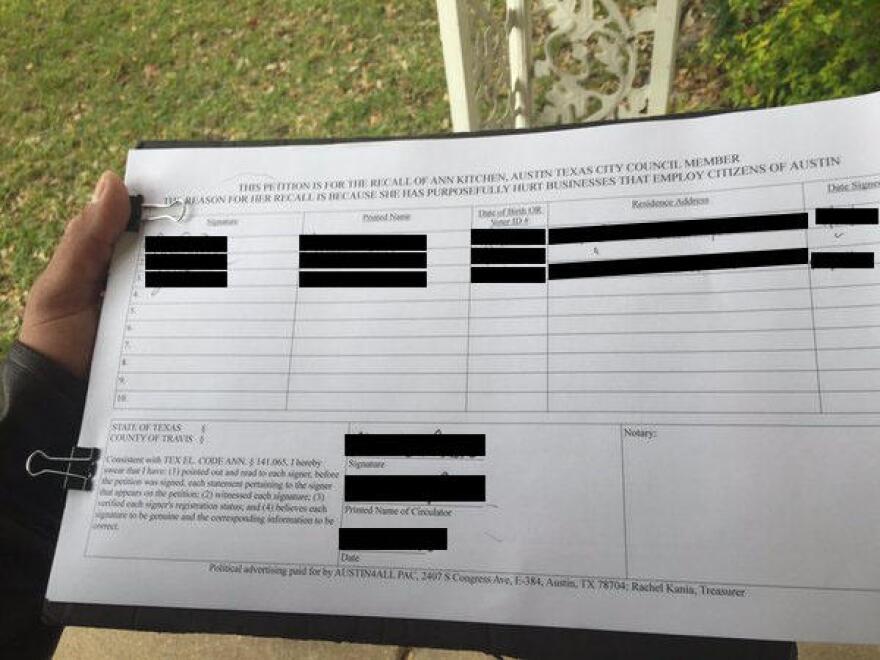When word first broke that a local political action committee calling itself Austin4All had enough signatures to recall City Council Member Ann Kitchen, most of her colleagues came out in force. Standing outside City Hall on Feb. 1, some council members joked they would be next.
But now that the threat of recall is more real (5,289 signatures of the needed 4,848 were turned in to the City Clerk Friday), some council members began to further reflect on what they have said is a misuse of the recall process.
“I think it’s laughable that frankly a group… think[s] that they can basically hijack our Council because of the way Council Member Kitchen voted on one issue,” said Council Member Delia Garza. But Tori Moreland and Rachel Kania, co-directors of Austin4All, said their recall effort goes beyond Kitchen’s support of stricter regulations for ridesharing companies (fingerprint-based background checks for all drivers being the most headline-grabbing of these).
“I just want to emphasize this is more than about Uber and Lyft,” said Moreland, in one of the first sit-down interviews the co-directors has done with the media. “That was just a symptom, so you could say, of the greater problem and that is that disconnect between the decisions being made at City Hall and the wants and desires of Austinites.”
Moreland said the campaign to recall Kitchen represents a long-standing division between the will of residents and those who represent them at City Hall. “What we wanted to do, especially with Austin4All, as its first landmark operation, is to go for the root of the problem,” said Moreland. “Cut the snake off at its head. Go straight in for it, and address the real issue and that is this out of touch, elitist, corporate-funded, backwards-thinking mindset at City Hall.”

Moreland said the 10-1 system, arguably designed to hand the reigns of local government over to those with fewer financial resources and a more low-key political status, has not done what it was set out to do. But some council members have said the PAC is the one removed from the needs of locals. Council Member Leslie Pool pointed to the contributors listed on the first financial report the PAC handed in Friday along with its recall petition. “The challenge is coming from people from outside of Austin,” said Pool. Five of the 11 contributors listed addresses outside of Austin (including Kyle, Hutto and Longview). None of the contributors are from District 5.
Kania with Austin4All said this does not represent a lack of district-wide support for the council member’s recall. “How can you call it lack of support when there’s 7,000 people who signed a petition?" she said. While the group handed in 5,289 signatures, they say they collected roughly 2,000 more than that. “I think that’s a good amount of support there.”
When campaigning, council members are subject to a cap on the amount of money they receive from non-Austin donors (that cap is $36,000). But there do not appear to be any residency regulations when it comes to donors on a recall petition. In the recent initiative petition to submit new ride-hailing rules to the city, companies Uber and Lyft (neither of which is headquartered in Austin) provided almost the entire funds for the effort.
Mayor Steve Adler considered the question of district-specific donors. “I would suspect that if Ann Kitchen was raising money to defend against a recall effort, she would probably seek for contributions that are outside her district,” he said. “And I’m not sure as I sit here that I would want to deny her the ability.” But he did say the now lower threshold of signatures needed to initiate a recall is something he might consider bringing to constituents. (With the new 10-1 system, 10 percent of the district’s active voters must sign a recall petition. Because prior council members did not represent a specific district, a recall petition needed 10 percent of the entire city’s registered voters).
“I’ve had some people raise the question as to whether or not we should revisit the threshold for a recall election,” said Adler. “And that might be a good conversation to have in the community.” No council members said this petition instilled fear or concern in them – especially when it came to casting future votes on issues so contentious as ridesharing regulations. “I think if anything this recall effort, it gives me resolve to vote the way that I believe is right for my constituents,” said Garza.




